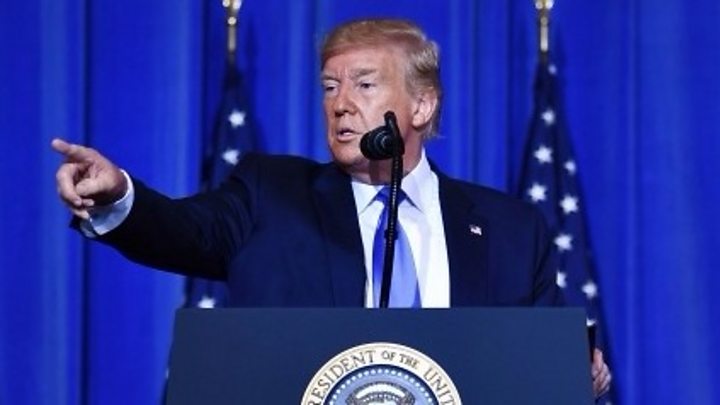Image copyright
AFP
European stock markets have fallen after the surprise decision by Donald Trump to impose new tariffs on a further $300bn of Chinese imports.
The FTSE 100 and the leading indexes in France and Germany all fell by more than 2% each.
The US president’s decision came after the latest round of bilateral talks showed little sign of a breakthrough.
The 10% tariffs, due to take effect on 1 September, effectively tax all Chinese imports to the US.
The FTSE 100 dropped by 2% to 7,426.13 points. In Germany, the Dax index dropped by 2.3% and the Cac 40 in France declined by 2.4%.
They followed similar falls in Asia where the Nikkei closed 2.1% lower and Hong Kong’s Hang Seng ended down 2.3%.
The tariffs are likely to target a wide range of goods, from smartphones to clothing.
A spokeswoman for China’s foreign ministry warned the country would retaliate against the US for imposing duties.
“If the US implements the tariff measures, China will have to take necessary counter-measures to resolutely defend the core interests of the country and its people.”
She declined to say what this might involve, but earlier this year it China signalled that it may curb exports of rare earth minerals to the US.
China is the largest producer of rare earths which are vital to a number of US industries such as electric car manufacturing and wind turbine production.
Image copyright
EPA
Japan’s Nikkei tumbled after US President Donald Trump announced new tariffs on Chinese goods
Mr Trump announced the tariff plan on Twitter on Thursday, while taking aim at China for not honouring promises to buy more US agricultural products at this week’s negotiations in Shanghai.
He also attacked Chinese President Xi Jinping for failing to do more to stem sales of the synthetic opioid fentanyl.
In later remarks, the US president told reporters the 10% tariffs were a short-term measure and could be lifted in stages to more than 25%.
This would be on top of the $250bn of Chinese goods that are already being taxed at 25% by the Trump administration.
Research firm Oxford Economics said: “We expect this step to make China less keen to achieve a deal and more determined to prepare itself for long-term economic tension with the US.”

Media playback is unsupported on your device
What has the response been so far?
The move has jolted financial markets and oil prices, as Washington and Beijing had described this week’s trade negotiations as constructive and scheduled another round of talks for September.
The US Chamber of Commerce, which represents more than three million US companies, said the latest tariffs on China “will only inflict greater pain on American businesses, farmers, workers and consumers, and undermine an otherwise strong US economy”.
It urged the two sides to remove all tariffs.
The latest round of duties comes amid growing concern that Mr Trump’s strategy may be backfiring.
On Thursday, his former chief economic adviser, Gary Cohn, told the BBC that the tariff battle was having a “dramatic impact” on US manufacturing and capital investment.

Media playback is unsupported on your device
The resulting tensions have also influenced the US central bank, the Federal Reserve, which cut interest rates on Wednesday for the first time in a decade.
Fed chair Jerome Powell said it was not the central bank’s job to criticise US trade policy, but added that trade tensions had “nearly boiled over” during May and June.
Mr Trump says his trade tactics are working, and that Beijing is feeling the pain. But China isn’t the only country that is hurting. The International Monetary Fund has warned that the US-China trade war is the biggest risk to the global economy.
There’s mounting evidence to show it’s also hitting the American economy. Data released last week showed that the US economy grew less than previously thought last year.
The figures showed foreign trade and business investment shrank as the trade war wore on.
US firms are holding off on expansion plans and investments, meaning new factories aren’t being built and new jobs aren’t being created.
All of this is making investors increasingly nervous, and there are now concerns that trade wars are being fought on multiple fronts, with a fresh one brewing between Japan and South Korea.
How did we get here?
China and the US have been engaged in a fractious dispute over trade since the early days of Mr Trump’s presidency.
While campaigning for the presidential election in 2016, Mr Trump repeatedly accused China of unfair trading practices and intellectual property theft.
He also wants to cut America’s trade deficit with China, which he says is hurting US manufacturing.
Image copyright
Alamy
Over the past year, both sides have imposed tariffs on billions of dollars of one another’s goods.
Despite several rounds of talks, the world’s two largest economies have failed to reach an agreement to end the trade war which has rattled investors and cast a shadow over the global economy.
